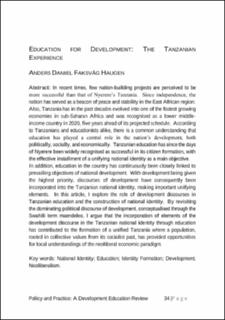| dc.contributor.author | Haugen, Anders Daniel Faksvåg | |
| dc.date.accessioned | 2023-03-23T11:29:37Z | |
| dc.date.available | 2023-03-23T11:29:37Z | |
| dc.date.created | 2022-10-23T20:51:56Z | |
| dc.date.issued | 2022 | |
| dc.identifier.citation | Policy & Practice: A Development Education Review. 2022, (35), 34-55. | en_US |
| dc.identifier.issn | 1748-135X | |
| dc.identifier.issn | 2053-4272 | |
| dc.identifier.uri | https://hdl.handle.net/11250/3060092 | |
| dc.description.abstract | In recent times, few nation-building projects are perceived to be more successful than that of Nyerere’s Tanzania. Since independence, the nation has served as a beacon of peace and stability in the East African region. Also, Tanzania has in the past decades evolved into one of the fastest growing economies in sub-Saharan Africa and was recognised as a lower middleincome country in 2020, five years ahead of its projected schedule. According to Tanzanians and educationists alike, there is a common understanding that education has played a central role in the nation’s development, both politically, socially, and economically. Tanzanian education has since the days of Nyerere been widely recognised as successful in its citizen formation, with the effective installment of a unifying national identity as a main objective. In addition, education in the country has continuously been closely linked to prevailing objectives of national development. With development being given the highest priority, discourses of development have consequently been incorporated into the Tanzanian national identity, making important unifying elements. In this article, I explore the role of development discourses in Tanzanian education and the construction of national identity. By revisiting the dominating political discourse of development, conceptualised through the Swahili term maendeleo, I argue that the incorporation of elements of the
development discourse in the Tanzanian national identity through education has contributed to the formation of a unified Tanzania where a population, rooted in collective values from its socialist past, has provided opportunities for local understandings of the neoliberal economic paradigm.
Key words: National Identity; Education; Identity Formation; Development; Neoliberalism. | en_US |
| dc.language.iso | eng | en_US |
| dc.publisher | Centre for Global Education | en_US |
| dc.rights | Navngivelse 4.0 Internasjonal | * |
| dc.rights.uri | http://creativecommons.org/licenses/by/4.0/deed.no | * |
| dc.title | Education for Development: The Tanzanian Experience | en_US |
| dc.type | Peer reviewed | en_US |
| dc.type | Journal article | en_US |
| dc.description.version | publishedVersion | en_US |
| dc.rights.holder | © Centre for Global Education 2022 | en_US |
| dc.source.pagenumber | 34-55 | en_US |
| dc.source.journal | Policy & Practice: A Development Education Review | en_US |
| dc.source.issue | 35 | en_US |
| dc.identifier.cristin | 2064071 | |
| cristin.ispublished | true | |
| cristin.fulltext | original | |
| cristin.qualitycode | 1 | |

